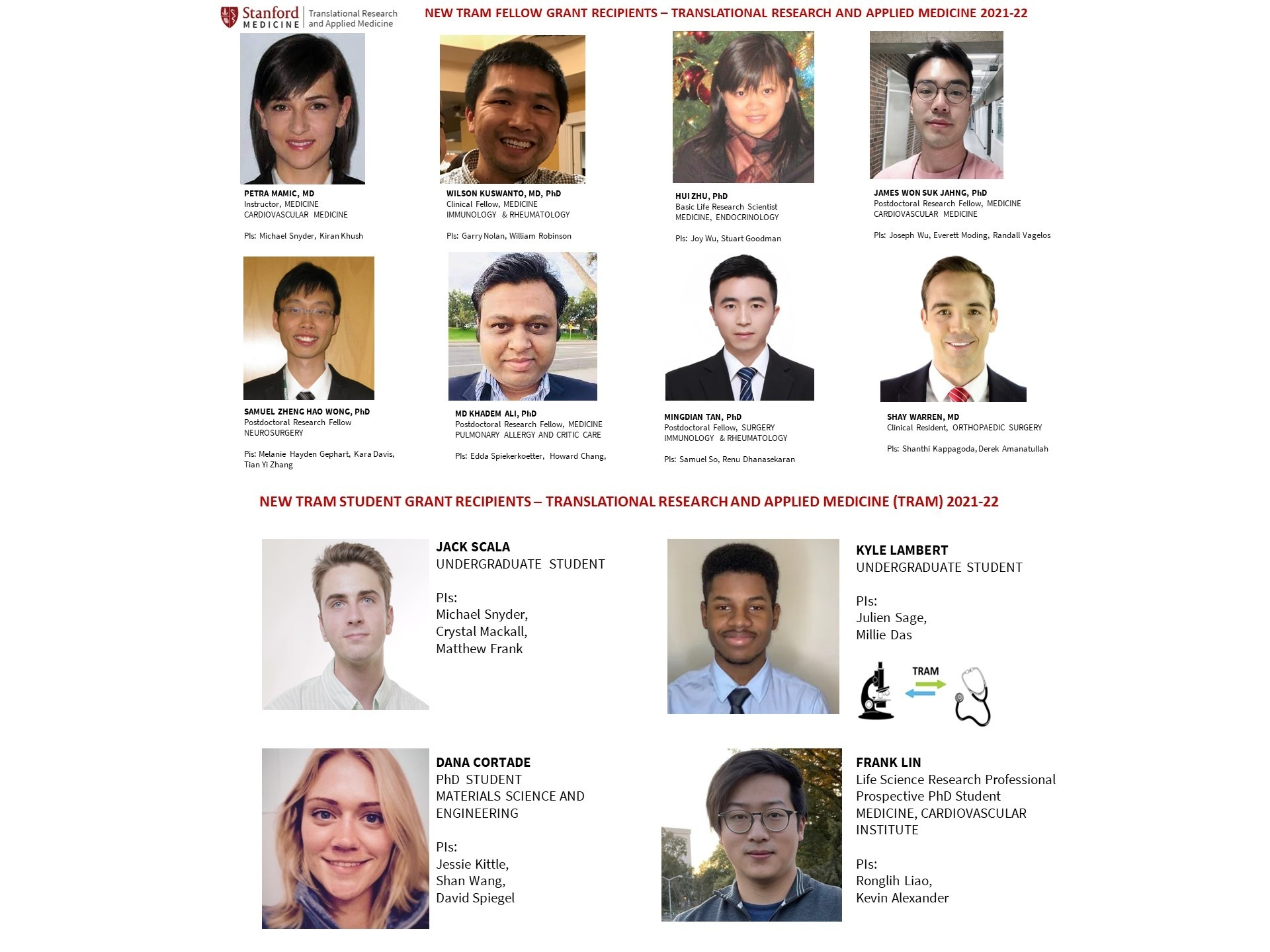Stanford Medicine announced the recipients of the 2021-22 Translational Research and Applied Medicine (TRAM) Pilot Grant this past September, funding a diverse set of research projects for the prevention, early detection, diagnosis and treatment of various human diseases. The school awarded 20 total grants — 12 for new projects and eight for continuing projects.
Of the 12 TRAM Scholars leading new projects, one is an instructor, five are postdoctoral fellows at the School of Medicine, one is a research scientist, one is a clinical resident, two are current or prospective graduate students and two are undergraduates.
Despite their differing levels of experience, the researchers have built camaraderie through the TRAM Center.
“Everyone is treated at the same level,” said Kyle Lambert ’24, one of two undergraduate TRAM Scholars. “We’re all learning from each other. No one is feeling left out.”
Wilson Kuswanto, a postdoc and another recipient of the grant, said he recently started a collaboration project with fourth-year orthopedic surgery resident Shay Warren, who he met through the TRAM Scholars program.
To researcher and TRAM Scholar Frank Lin, the community is more than academic. It is “a very diverse and inclusive group that’s beyond science,” Lin said. “We’re like a family.”
The TRAM Scholars program was created by oncology professor Dean Felsher and Translational Applications Service Center Scientific Director Joanna Liliental in 2011.
“The idea is to create a kind of loving, nurturing incubator for people throughout different levels of training to pursue a project that has medical translational significance,” Felsher said.
Along with research funding, TRAM scholars are expected to present their research to a class of undergraduate, graduate and medical students in the class MED 121/221: Translational Research in Applied Medicine. The class is made up of a lab seminar component, led by leaders in translational and other medical research (once including University President Marc Tessier-Lavigne), and a laboratory group meeting in which TRAM scholars present their work to the class.
The presentation component allows students and scholars to exchange ideas and learn more from one other. Jack Scala ’24 took MED 121 all three quarters of his freshman year.
“I would ask questions during research presentations, and they would give very detailed and accessible answers that I could understand, or I even had scholars follow up on my questions by emailing me different papers to read,” he said. Since taking MED 121, Scala has become a TRAM scholar and now presents his work to the class.
The classroom component encourages researchers to communicate in ways the public, or at least people with a general understanding of medicine, can understand “instead of being siloed into this higher level of academics,” said sixth-year Ph.D. candidate Dana Cortade MS ’18, another TRAM scholar.
To describe the use of jargon in the seminars, Lin explained a simple rule: “If you can’t explain your science in simple words, that probably means you don’t understand it as much as you’d like.”
To create a community of medical professionals with a broad set of interests, the TRAM Pilot Grant funded research for a diverse set of topics in the medical field. The research that the TRAM scholars conduct will be used to develop methods of early detection and treatments for complications arising from cancer treatments and conditions including arthritis, pulmonary arterial hypertension and obstetric pain while giving birth. The researchers are using biomarker measurements, cell reprogramming, genetic testing and other methods to conduct these studies.
According to its website, the TRAM pilot program is designed “to support diverse translational research projects that use innovative approaches for prevention, early detection, diagnosis and treatment of various human diseases.” The award can be as high as $5,000 for students and $20,000 for fellows, residents and instructors. Applications for 2022-23 are due on July 20.
